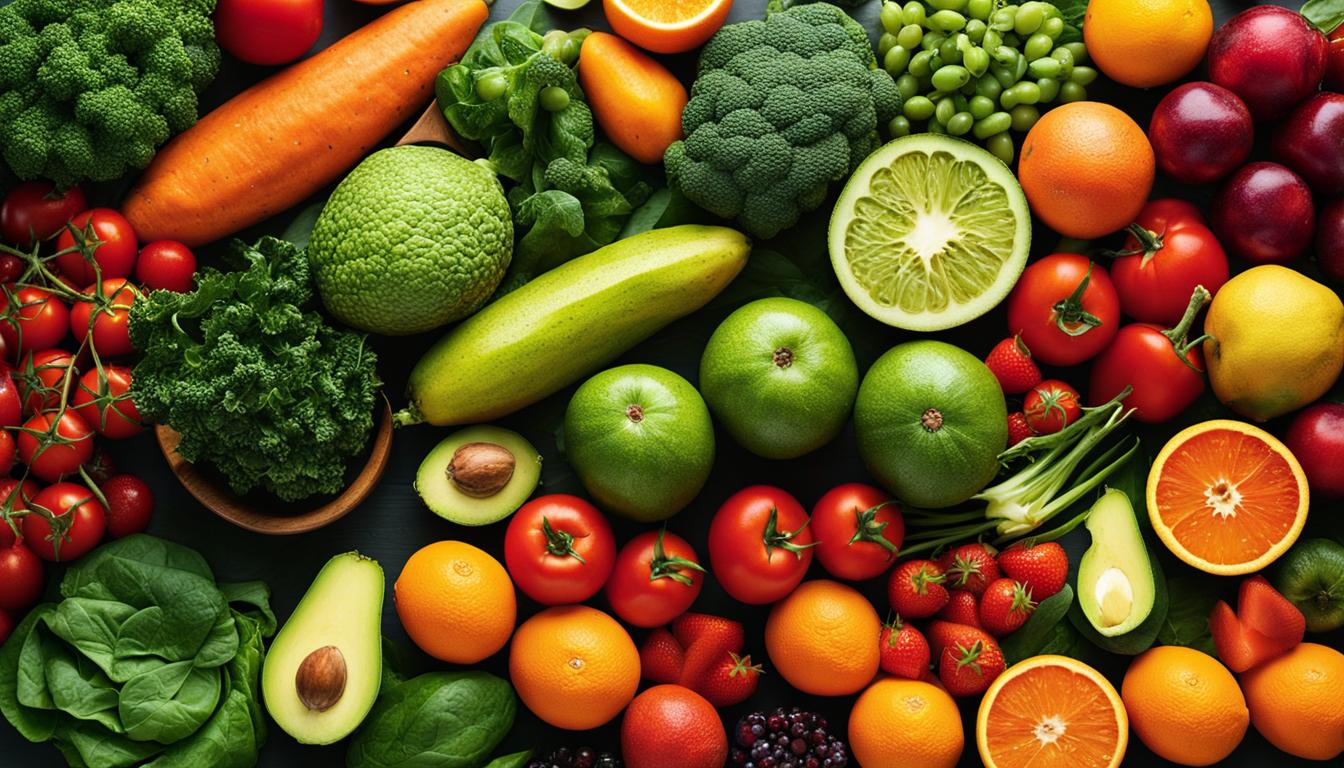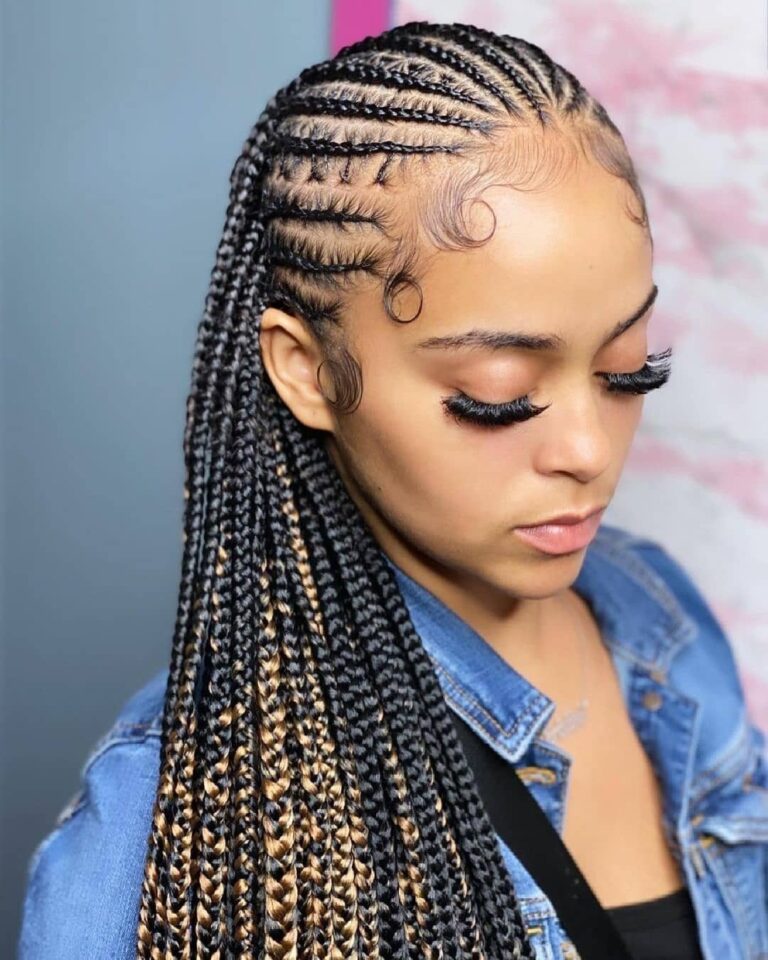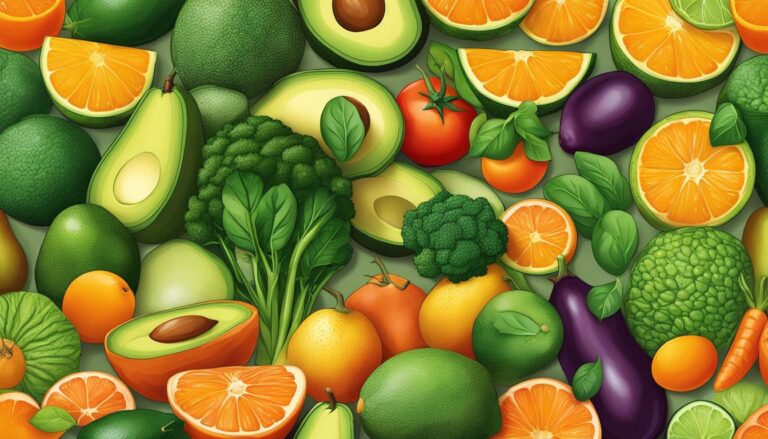What Food Helps Hair Grow?
Eating a healthy diet is crucial for promoting hair growth. The food we consume plays a significant role in the overall health of our hair. To ensure that your hair is growing strong and healthy, it’s important to include foods that are rich in essential nutrients.
Protein, vitamins (such as B12 and D), biotin, iron, and omega-3 fatty acids are some of the key nutrients that can support hair growth. Including these nutrients in your diet can provide the necessary building blocks for healthy hair follicles and promote optimal hair growth.
So, what foods should you include in your diet to help your hair grow? Let’s explore some of the top options:
Key Takeaways:
- Eating a balanced diet is essential for promoting healthy hair growth.
- Protein, vitamins (such as B12 and D), biotin, iron, and omega-3 fatty acids are key nutrients for hair health.
- Including eggs, berries, spinach, and fatty fish in your diet can provide these essential nutrients.
- Nutritional deficiencies can have a negative impact on hair health and may result in hair loss.
- Consult with a healthcare professional for personalized advice on maintaining a healthy diet for hair growth.
The Impact of Nutritional Deficiency on Hair
Nutrition plays a crucial role in maintaining the health of our hair. A deficiency in essential nutrients can have a significant impact on the overall condition and growth of our hair. Studies have shown that certain nutritional deficiencies are closely linked to hair loss and decreased hair health.
One of the key nutrients involved in hair health is vitamin B12. This vitamin plays a vital role in the production of red blood cells, which supply oxygen to the hair follicles. A deficiency in vitamin B12 can lead to decreased oxygen supply, causing weakened hair and increased hair loss.
Beyond vitamin B12, other nutrients like biotin, iron, and vitamins D and E also influence hair health. Biotin, commonly known as vitamin H, is crucial for the production of keratin, the protein that makes up our hair strands. Iron deficiency can result in anemia, which hampers the delivery of nutrients to the hair follicles. Vitamin D helps regulate hair follicle cycling, making it essential for maintaining healthy hair growth.
Nutritional deficiencies can manifest in various ways, impacting not only the health of our hair but also our overall well-being. It is important to ensure we consume a well-balanced diet, rich in essential nutrients, to promote optimal hair health and prevent deficiencies.
The Role of Diet in Hair Loss
It is important to note that nutritional deficiencies are not the sole cause of hair loss. Other factors like genetics, hormonal imbalances, and stress can also contribute to hair loss. However, maintaining a healthy diet that provides an adequate intake of essential nutrients is a proactive step in promoting hair health and preventing excessive hair loss.
- Ensure you include a variety of nutrient-rich foods in your diet, such as lean meats, eggs, leafy greens, and fatty fish.
- Consider incorporating supplements, under the guidance of a healthcare professional, to address any specific nutrient deficiencies.
- Manage stress levels and adopt holistic approaches to overall wellness, as stress can impact hair health.
In conclusion, the impact of nutritional deficiency on hair health should not be overlooked. Proper nutrition, including a balance of vitamins, minerals, and proteins, is essential for supporting healthy hair growth. By nourishing our bodies with the right nutrients, we can help maintain the strength, thickness, and overall luster of our hair.
Eggs – A Protein and Biotin-Rich Food for Hair Growth
Eggs are a powerhouse when it comes to promoting healthy hair growth. They are not only a great source of high-quality protein but also contain biotin, a vitamin that is essential for strong and vibrant hair.
Protein is the building block of hair, and consuming an adequate amount of protein is necessary for the production of keratin, the protein that makes up the hair shaft. Including eggs in your diet provides your body with the necessary amino acids to support the growth and strength of your hair.
In addition to protein, eggs are rich in biotin, a B-vitamin that plays a crucial role in hair growth. Biotin is involved in the production of keratin as well and can help improve hair growth, especially in individuals with a biotin deficiency. Including eggs in your diet can help ensure that your body has enough biotin to support healthy hair.
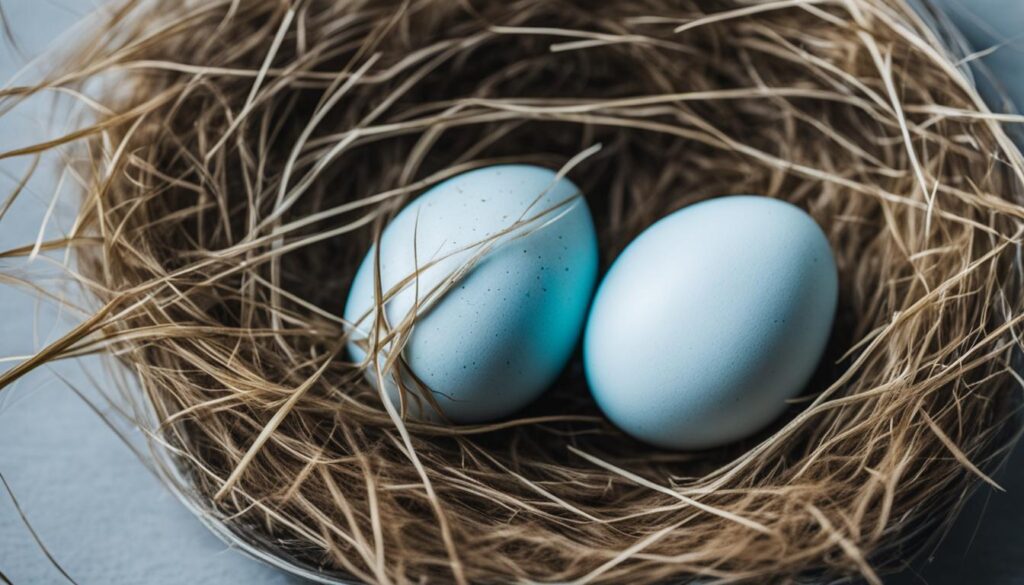
The Benefits of Eggs for Hair Growth:
- High-quality source of protein, the building block of hair
- Rich in biotin, a B-vitamin essential for hair growth
- Provides necessary amino acids for hair strength and vitality
- Contains zinc and selenium, which support overall hair health
Adding eggs to your diet is a simple and delicious way to support healthy hair growth. Whether you enjoy them boiled, scrambled, or in omelets, eggs provide the essential nutrients your hair needs to thrive.
Berries – Antioxidant-Rich Foods for Hair Health
Berries are not only delicious but also offer numerous benefits for your hair health. They are rich in antioxidants, which play a crucial role in promoting hair growth. Antioxidants help protect the hair follicles from damage caused by free radicals, which can contribute to hair thinning and breakage. By neutralizing these harmful molecules, antioxidants help maintain the overall health and strength of your hair.
Vitamin C, another important nutrient found in berries, is essential for healthy hair growth. It stimulates collagen production, a protein that strengthens the hair strands and prevents them from becoming brittle. Additionally, vitamin C enhances iron absorption in the body, which is crucial for maintaining healthy hair follicles and promoting proper growth.
Including a variety of berries in your diet, such as strawberries, blueberries, and raspberries, can provide your hair with a powerful dose of antioxidants and vitamin C. These fruits can be enjoyed on their own, added to smoothies, or used as a topping for yogurts and cereals. Incorporating berries into your daily meals is a tasty way to support your hair health.
Spinach – Nutrient-Dense Vegetable for Hair Growth
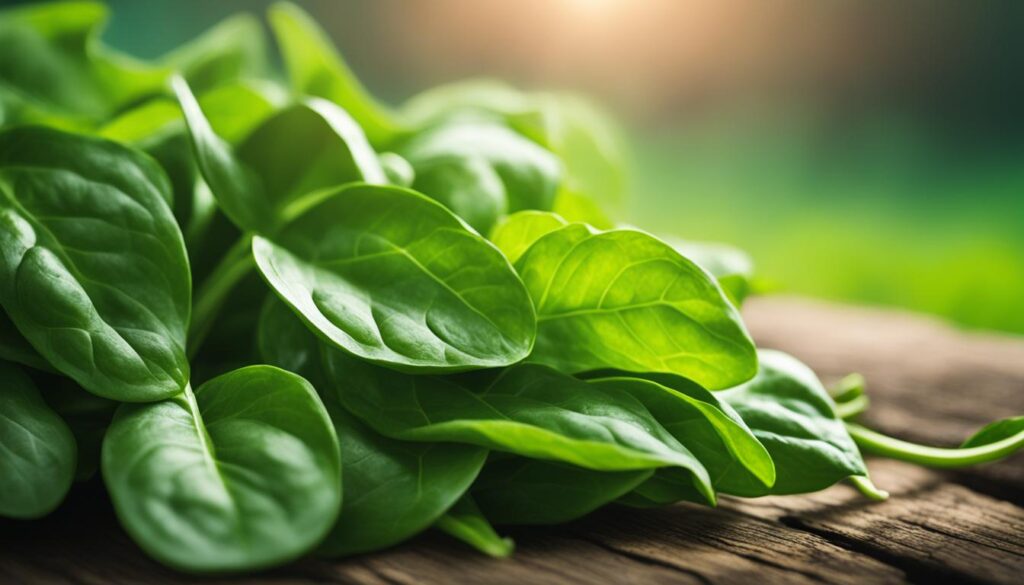
When it comes to promoting hair growth, spinach is a nutrient powerhouse that should not be overlooked. Packed with essential vitamins and minerals, spinach provides numerous benefits for your hair health.
First and foremost, spinach is an excellent source of folate, a B vitamin that plays a crucial role in hair growth and development. Folate is necessary for the production of DNA, which is essential for the growth of hair follicles. By ensuring an adequate intake of folate through foods like spinach, you can support healthy hair growth from the root.
In addition to folate, spinach is also rich in iron, a mineral that is vital for proper hair growth. Iron helps carry oxygen to the hair follicles, ensuring they receive the necessary nutrients for healthy hair production. Including spinach in your diet can help prevent iron deficiency, which is a leading cause of hair loss.
Furthermore, spinach contains vitamins A and C, both of which contribute to optimal hair health. Vitamin A supports the production of sebum, the natural oil that moisturizes the scalp and keeps the hair hydrated. On the other hand, vitamin C aids in collagen production, a protein that strengthens the hair strands. By incorporating spinach into your meals, you can nourish your hair from within and promote its overall health and vitality.
Fatty Fish – A Source of Omega-3 and Vitamin D for Healthy Hair
When it comes to promoting healthy hair, fatty fish is a star ingredient. Not only are fatty fish like salmon, herring, and mackerel delicious, but they also provide essential nutrients that support hair growth. One of the key components found in fatty fish is omega-3 fatty acids, which have been linked to improved hair density and growth. These fatty acids nourish the hair follicles and promote overall scalp health, leading to stronger and healthier hair.
In addition to omega-3 fatty acids, fatty fish is also an excellent source of vitamin D. Vitamin D is important for the hair growth cycle, as it helps create new hair follicles and stimulates the existing ones. A deficiency in vitamin D has been associated with hair loss, so consuming fatty fish can help ensure that you’re getting an adequate amount of this vital nutrient.
But omega-3 fatty acids and vitamin D aren’t the only hair-loving nutrients found in fatty fish. They also provide protein, selenium, and B vitamins, all of which contribute to healthy hair. Protein is essential for hair growth as it provides the building blocks for strong, resilient hair strands. Selenium helps maintain a healthy scalp, while B vitamins are involved in the production of red blood cells, which carry oxygen and nutrients to the hair follicles.
The Benefits of Fatty Fish for Hair Growth:
- Rich in omega-3 fatty acids: Omega-3 fatty acids nourish the hair follicles and promote hair growth.
- Abundant in vitamin D: Vitamin D stimulates hair follicles and contributes to healthy hair growth.
- Provides essential proteins: Protein is crucial for the production of strong and resilient hair strands.
- Contains selenium and B vitamins: Selenium supports a healthy scalp, while B vitamins aid in the transportation of nutrients to the hair follicles.
Eating fatty fish regularly can provide your hair with the necessary nutrients it needs to grow strong and healthy. Incorporate these delicious fish into your diet to promote hair growth and maintain overall hair health.
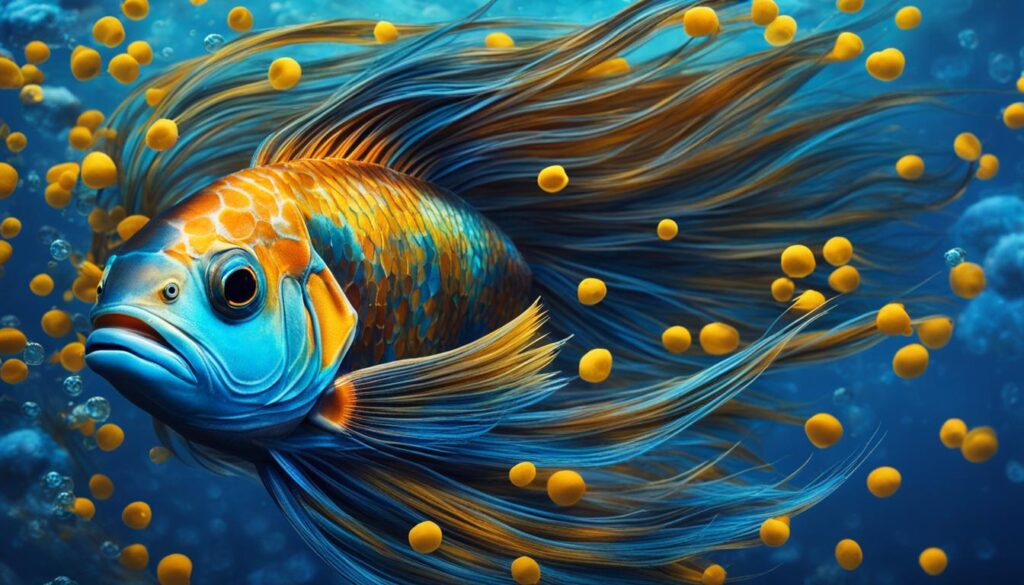
Sweet Potatoes – Rich in Beta-Carotene for Hair Health
If you’re looking to improve the health of your hair, sweet potatoes may be the answer. These delicious root vegetables are not only tasty but also packed with nutrients that can support hair growth and overall hair health. One of the key nutrients found in sweet potatoes is beta-carotene, which is converted into vitamin A in the body. Vitamin A plays a critical role in the development of hair follicles and the production of sebum, an oily substance that keeps the hair hydrated.
Including sweet potatoes in your diet can help ensure that you’re getting enough beta-carotene and vitamin A, which are vital for healthy hair growth. However, it’s important to avoid excessive vitamin A consumption, as it can actually lead to hair loss. As with any food, moderation is key.
Not only are sweet potatoes rich in beta-carotene, but they also provide other essential nutrients that promote hair health. They are a good source of fiber, which can support digestion and nutrient absorption. Sweet potatoes are also packed with vitamins C and E, both of which have antioxidant properties that help protect hair follicles from damage caused by free radicals.
Incorporating sweet potatoes into your meals is easy and delicious. Try roasted sweet potato wedges, mashed sweet potatoes, or even sweet potato fries for a tasty and nutritious addition to your diet. Your hair will thank you for it!
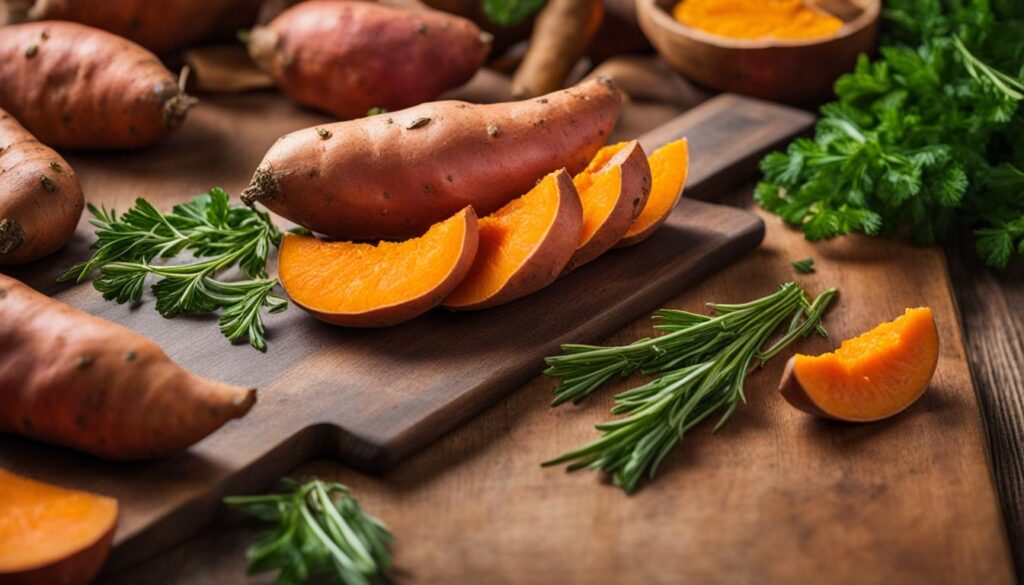
Conclusion
In summary, maintaining a healthy diet is crucial for promoting hair growth and overall hair health. By including a variety of nutritious foods in your daily meals, you can ensure that your hair receives the essential nutrients it needs to thrive.
Eggs, berries, spinach, and fatty fish are excellent choices that provide protein, vitamins, minerals, and antioxidants that support hair growth. Protein-rich eggs and biotin-packed berries contribute to the production of keratin, the protein building block of hair. Meanwhile, spinach supplies folate, iron, and vitamins A and C, which are essential for proper hair development and strength.
Fatty fish not only provide omega-3 fatty acids for improved hair density but also deliver vitamin D, which plays a significant role in the hair growth cycle. Additionally, sweet potatoes offer beta-carotene, a precursor to vitamin A that aids in hair follicle development and sebum production.
To achieve the best results, it is important to maintain overall health, manage stress levels, and consult a healthcare professional for personalized advice. By incorporating these healthy foods into your diet, you can nourish your hair from within and support optimal hair growth.
FAQ
What foods help hair grow?
Eating a balanced diet that includes foods rich in essential nutrients such as protein, vitamins (B12, D), biotin, iron, and omega-3 fatty acids can promote healthy hair growth.
What is the impact of nutritional deficiency on hair?
Nutritional deficiencies, particularly in vitamins B12 and D, biotin, riboflavin, iron, and other nutrients, are associated with hair loss and can have a significant impact on hair health.
How do eggs contribute to hair growth?
Eggs are an excellent source of protein and biotin, which are crucial for hair growth. Protein is necessary for the production of keratin, the protein that makes up the hair shaft, while biotin supports keratin production and can improve hair growth in individuals with deficiencies. Eggs also contain zinc and selenium, which support hair health.
What role do berries play in hair health?
Berries, such as strawberries, are rich in antioxidants and vitamin C, which can support hair growth. Antioxidants protect hair follicles from damage, while vitamin C promotes collagen production and aids in iron absorption, both important for healthy hair.
How does spinach contribute to hair growth?
Spinach is a nutrient-dense vegetable that provides folate, iron, and vitamins A and C, all of which are important for hair growth. Vitamin A supports hair growth, iron helps carry oxygen to the hair follicles, and folate is necessary for proper hair development. Vitamin C aids collagen production for stronger hair strands.
How do fatty fish promote healthy hair?
Fatty fish such as salmon, herring, and mackerel are rich in omega-3 fatty acids and vitamin D, both of which can promote healthy hair growth. Omega-3 fatty acids have been linked to improved hair density and growth, while vitamin D is important for the hair growth cycle. Fatty fish also provide protein, selenium, and B vitamins that support hair health.
How can sweet potatoes contribute to hair health?
Sweet potatoes are a great source of beta-carotene, which is converted into vitamin A in the body. Vitamin A plays a critical role in hair follicle development and the production of sebum, an oily substance that keeps the hair hydrated. However, excessive vitamin A consumption should be avoided, as it can lead to hair loss.
What are the key takeaways for promoting hair growth?
Consuming a balanced diet that includes foods rich in protein, vitamins (especially B12 and D), biotin, iron, omega-3 fatty acids, and antioxidants can support healthy hair growth. Eggs, berries, spinach, and fatty fish are some of the top foods recommended for promoting hair health. Additionally, maintaining overall health and managing stress levels are important factors in supporting optimal hair growth. It is recommended to consult with a healthcare professional for personalized advice.

